Latest Contributions
An American Missionary in India – Silver Years of Service
Category:
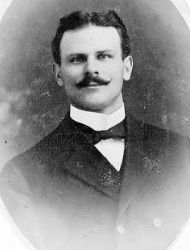
The Rev. Carl C. Herrmann (1879-1968), a Methodist missionary, went to Jabalpur, India in 1908. After several years, he became principal of the Bible Training School (now Leonard Theological College) and superintendent of the Khandwa District. Mr. Herrmann went to the Philippines in 1920, and returned to India in 1927. He became superintendent of Aligarh district. His first wife died after a year of marriage. His second wife, Florence, served with him from 1910 until her death in 1944. They had four children, three boys and a girl. In 1947, Mr. Herrmann married Lahuna Clinton, a missionary in India since 1910. They returned to the US when he retired in 1948.
Editor’s note: This material has been provided by Camy Rea, who is a descendant of the Herrmann family.
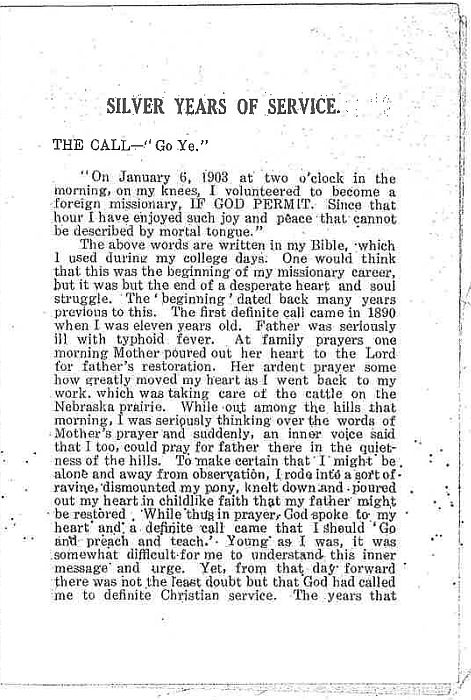
SILVER YEARS OF SERVICE
THE CALL! "Go Ye"
On January 6, 1903 at two o'clock in the morning, on my, knees, l volunteered to become a
foreign missionary, IF GOD PERMIT. Since that hour I have enjoyed such joy and peace that cannot be described by mortal tongue. The above words are written in my Bible, which I used during my college days. One would think that this was the beginning of my missionary career, but it was but the end of a desperate heart and soul struggle. The beginning dated back many years previous to this. The first definite call came in 1890 when I was eleven years old. father was seriously ill with typhoid fever. At family prayers one morning mother poured out her heart to the lord for father's restoration. Her ardent prayer somehow greatly moved my heart as I went back to my work, which was taking care of the Cattle on the Nebraska prairie. While out among the hills that morning, l was seriously thinking over the words of Mothers prayer and suddenly, an inner voice Said that I too, could pray for father there in the quietness of the hills. To make certain that I might be alone and away from observation, I rode into a sort of ravine, dismounted my pony, knelt down and poured out my heart in childlike faith that my father might be restored. While thus in prayer, God spoke to my heart and a definite call came that I Should Go and preach and teach. Young as I was, it was somewhat difficult for me to understand this inner message and urge. Yet, from that day forward there was not the least doubt but that God had called me to definite Christian service. The years that followed were spent in trying to get myself adjusted to the call and to make preparations accordingly.
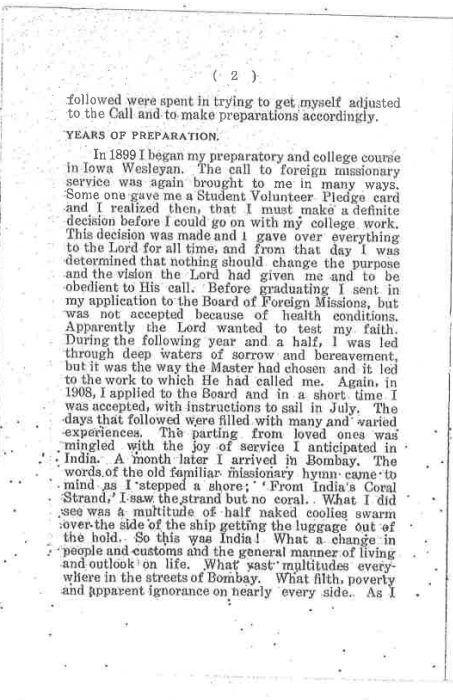
YEARS OF PREPARATION
In 1899 I began my preparatory and college course in Iowa, Wesleyan. The call to foreign missionary service was again brought to me in many ways. Someone gave me a Student Volunteer Pledge card and I realized then, that I must make a definite decision before I could go on with my college work. This decision was made und I gave over everything to the Lord for all time, and from that day I was determined that nothing should change the purpose and the vision the Lord had given me and to be obedient to his call. Before graduating I sent in my application to the Board of Foreign Missions, but was not accepted because of health conditions. Apparently, the Lord wanted to test my faith. During the following year and a half, I was led through deep waters of sorrow and bereavement, but it was the way the Master had chosen and it led to the work to which he had called me. Again, in 1908, I applied to the Board and in a short time I was accepted, with instructions to sail in July. The days that followed were filled with many and varied experiences. The parting from loved ones was mingled with the joy of service I anticipated in India. A month later I arrived in Bombay. The words of the old familiar missionary hymn came to mind as I stepped a shore. From India's Coral Strand, I saw the strand but no coral. What I did see was a multitude of half-naked coolies swarm over the side of the ship getting the luggage out of the hold. So, this was India! What a change in people and customs and the general manner of living and outlook on life. What vast multitudes everywhere in the streets of Bombay. What filth, poverty and apparent ignorance on nearly every side. As I watched the multitudes surge those narrow city streets I thought of that verse in scripture.
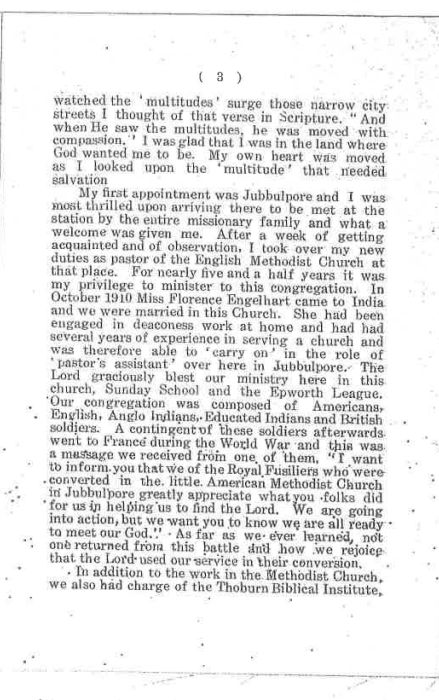
And when He saw the multitudes, he was moved with. compassion. l was glad that I was in the land where God wanted me to be. My own heart was moved as l looked upon the multitude that needed salvation.
My first was appointment was Jubbulpore and I was most thrilled upon arriving there to be met at the station by the entire missionary family and what a welcome was given me. After a week of getting acquainted and of observation, I took over my new duties as pastor of the English Methodist Church at that place. For nearly five and a half years it was my privilege to minister to this Congregation. In October 1910 Miss Florence Englehart came to India and we were married in this Church. She had been engaged in deaconess work at home and had had several years of experience in serving a church and was therefore able to carry on in the role of pastor's assistant over here in Jubbulpore. The Lord graciously blest our ministry here in this church, Sunday School and the Epworth League. Our congregation was composed of Americans, English, Anglo Indians, Educated Indians and British soldiers. A contingent of these soldiers afterwards went to France during the World War and this was a message we received from them. I want to inform you that we the Royal Fusiliers who were converted in the little American Methodist Church in Jubbulpore greatly appreciate what you folks did in helping us to find the Lord. We are going into action, but we want you to know we are all ready to meet our God. As far as we ever learned, not one returned from the battle and how we rejoice that the Lord used our service in their conversion.
In addition to the work in the Methodist Church, we also had charge of the Thoburn Biblical Institute, a Bible training school for our young Indian candidates for the ministry. Some of these boys are now outstanding pastors in the Central Provinces Annual Conference. A piece of property was purchased by us for the site of the school and we had the pleasure of establishing the Institute in its new setting. The work of the English church had been taken over by our worthy successor and we were expecting to be appointed to give full time to the teaching and work in the Bible Institute.
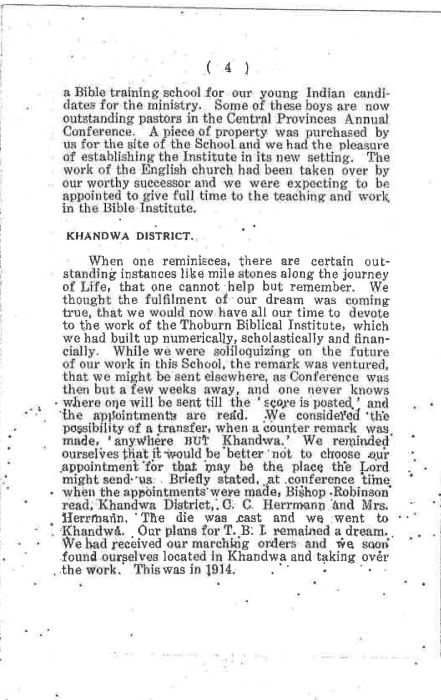
KHANDWA DISTRICT
When one reminisces, there are certain outstanding instances like mile stones along the journey of Life, that one cannot help but remember. We thought the fulfilment of our dream was coming true, that we would now have all our time to devote to the work of the Thoburn Biblical Institute, which we ·had built up numerically, scholastically and financially. While we were soliloquizing on the future of our work in this School, the remark was ventured, that we might be sent elsewhere, as Conference was then but a few weeks away, and one never knows where one will be sent until the score is posted and the appointments are read. We considered the possibility of a transfer, when a counter remark was made, anywhere but Khandwa. We reminded ourselves that it would be better not to choose us
appointment for that may be the place the Lord might send us. Briefly stated, at conference time when the appointments were made, Bishop Robinson read Khandwa District, C. C. Herrmann and Mrs. Herrmann. · The die was cast and we went to Khandwa. Our plans for T.B.I. remained a dream. We had received our marching orders and we soon found ourselves located In Khandwa and taking over the work. This was in 1914.
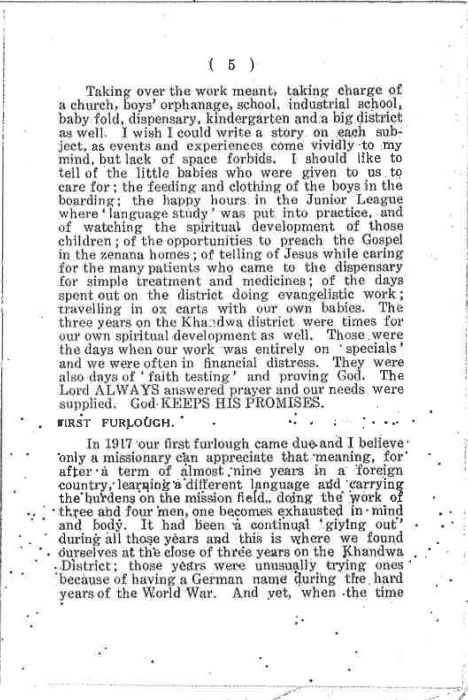
Taking over the work meant, taking charge of a church, boys' orphanage, school. Industrial school, baby fold, dispensary, kindergarten and a big district as well. I wish I could write a story on each subject, as events and experiences come Vividly to my mind, but lack of space forbids. I should like to tell of the little babies who were given to us to care for, the feeding and clothing of the boys in the boarding, the happy hours in the Junior League where language study was put into practice, and of watching the spiritual development of those children, of the opportunities to preach the gospel in the zenana homes, of telling of Jesus while caring for the many patients who came to the dispensary for simple treatment and medicines, of the days spent out on the district doing evangelical work, traveling in ox carts with our own babies. The three years on the Khandwa district were times for our own spiritual development as well. Those were the days when our work was entirely on specials and we were often in financial distress. They were also days of faith testing and proving God. The Lord ALWAYS answered prayer and our needs were supplied. God KEEPS HIS PROMISES.
FIRST FURLOUGH
In 1917 our first furlough came due and I believe only a missionary can appreciate that meaning. For· after a term of almost nine years in a foreign country, learning a different language and carrying the burdens on the mission field. Doing the work of three and four men, one becomes exhausted in mind and body. It had been a continual giving out during all those years and this where we found ourselves at the close of three years on the Khandwa District, those years were unusually trying ones because of having a German name during the hard years of the World War.
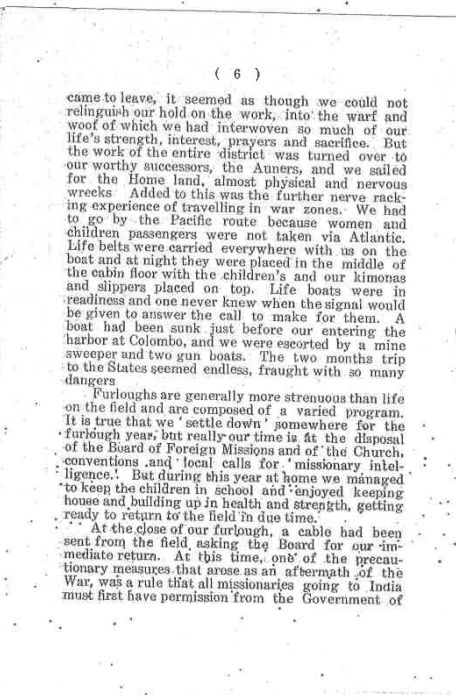
And yet, when the time came to leave, it seemed as though we could not relinquish our hold on the work, into the warf and woot of which we had interwoven so much of our life's strength, interest, prayers and sacrifice. But the work of the entire district was turned over to our worthy successors, the Auners, and we sailed for the Home land almost physical and nervous wrecks. Added to this was the further nerve-racking experience of travelling in war zones. We had to go by the Pacific route because women and children passengers were not taken via Atlantic. Life belts were carried everywhere with us on the boat and at night they were placed in the middle of the cabin floor with the children's and our kimono's and slippers placed on top. Life boats were in readiness and one never knew when the signal would be given to answer the call to make for them. A boat had been sunk just before our entering the harbor at Colombo, and we were escorted by a mine sweeper and two-gun boats. The two months trip to the States seemed endless, fraught with so many dangers. Furloughs are generally more strenuous than life on the field and are composed of a varied program. lt is true that we settle down somewhere for the furlough year, but really our time is at the disposal of the Board of Foreign Missions and of the Church, conventions and local calls for missionary intelligence. But during this year at home we managed to keep the children in school and enjoyed keeping house and building up in health and strength, getting ready to return to the field in due time. At the close of our furlough, a cable had been sent from the field asking the Board for our -immediate return. At this time, one of the precautionary measures that arose as an aftermath of the war, was a rule that all missionaries going to India must first have permission from the Government of India.
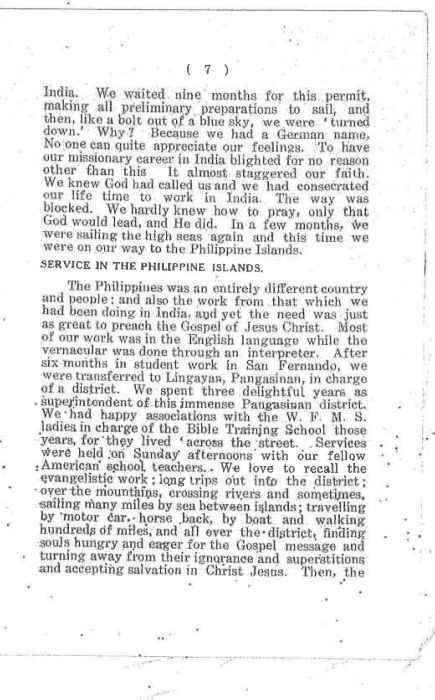
We waited nine months for this Permit. making all preliminary preparations to sail, and then like a bolt out of a blue sky, we were turned down. Why? Because we had a German name. No one can quite appreciate our feelings. To Have our missionary career in India blighted for no reason other this. It almost staggered our faith. We knew God had called us and we had consecrated our life time to work in India. The way was blocked. We hardly knew how to pray, only that God would lead, and he did. In a few months, were on our way to the Philippine Islands.
SERVICE IN THE PHILIPPINE ISLANDS
The Philippines was an entirely different country and people, and also the work from that which we had been doing in India, and yet the need was just as great to preach the Gospel of Jesus Christ. Most of our work was ln the English language while the vernacular was done through an interpreter. After six months in student work in San Fernando we were transferred to Lingayan, Pangasinan, In charge of a district. We spent three delightful years as superintendent of this immense Pangasinan district. We had happy associations with the W.F. M. S. ladies in charge of the Bible Training School those years, for they lived across the street. Services were held on Sunday afternoons with our fellow American school teachers. We love to recall the evangelistic work, long trips out into the district over the mountains, crossing rivers and sometimes, sailing many miles by sea between islands, travelling by motor car, horseback, by boat and walking hundreds of miles, all over the district, finding souls hungry and eager for the Gospel message and turning away from their ignorance and superstitions and accepting salvation in Christ Jesus.
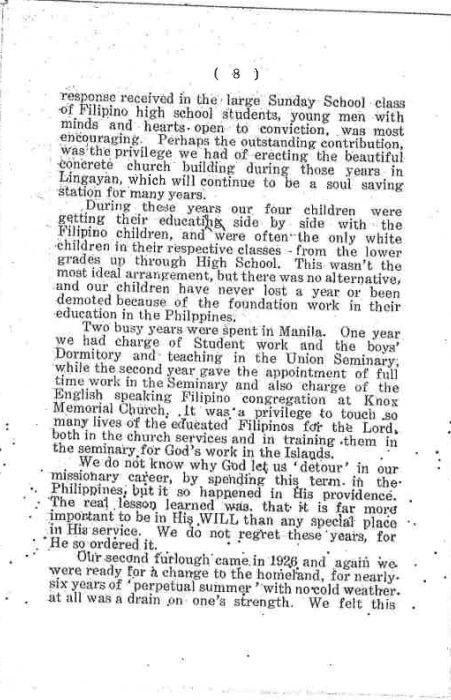
Then, the response received in the large Sunday School class of Filipino high school students, young men with minds and heart open to conviction, was most encouraging. Perhaps the outstanding contribution was the privilege we had of erecting the beautiful concrete church building· during those years in Lingayan, which will continue to be a soul saving station for many years.
During these years our four children were getting their education side by side with the Filipino children, and were often the only white children in their respective classes from the lower grades up through High School. This wasn't the most ideal arrangement, but there was no alternative, and our children have never lost a year or been demoted because of the foundation work in their education in the Philippines.
Two busy years were spent ln Manila. One year we had charge of Student work and the boys Dormitory and teaching in the Union Seminary, while the second year gave the appointment of full-time work In the Seminary and also charge of the English-speaking Filipino congregation at Knox Memorial Church. It was a privilege to touch so many lives of the educated Filipinos for the Lord, both in the church services and in training them in the seminary for God's work in the Islands.
We do not know why God let us detour in our missionary career, by spending this term in the Philippines but it so happened in his providence. The real lesson learned was that it is far more important be in His WILL than any special place in his service. We do not regret these years, for He so ordered it.
Our second furlough came in 1926 and again we were ready for a change to the homeland, for nearly six years of perpetual summer with no cold weather at all was a drain on one's strength. We felt this year at home to be a very profitable one in many ways. Perhaps the most personal feature was our re-united family, for our oldest son had finished his high school career in Manila and had sailed for the homeland and college the year before. It was good to be together on this furlough and really it was the last time that we would ever be together as a family, because Cedric has since established his own home.
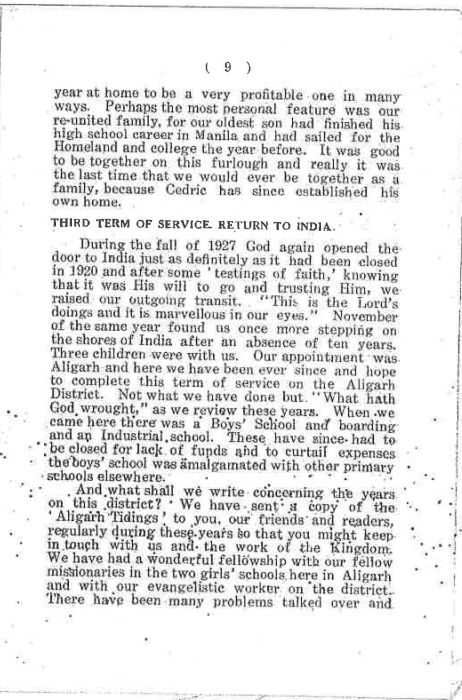
THIRD TERM OF SERVICE RETURN TO INDIA
During the fall of 1927 God again opened the door to India just as definitely as it had been closed in 1920 and after some testing's of faith, knowing that it was His will to go and trusting Him, we raised our outgoing transit. This is the Lord's doings and It is marvelous in our eyes. November of the same year found us once more stepping on the shores of India after an absence of ten years. three children were with us. Our appointment was Aligarh and here we have been ever since and hope to complete this term of service on the Aligarh District. Not what we have dune but "What hath God Wrought," as we review these years. When we came here there was a Boys School and boarding and an Industrial school. These have since had to be closed for lack of funds and to curtail expenses the boy's school was amalgamated with other primary schools elsewhere.
And what shall we write concerning the years on this district? We have sent a copy of the Aligarh Tidings to you, our friends and readers, regularly during these years so that you might keep in touch with us and the work of the Kingdom. We have had -wonderful fellowship with our fellow missionaries in the two girls' school here in Aligarh and with our evangelistic worker on the district.
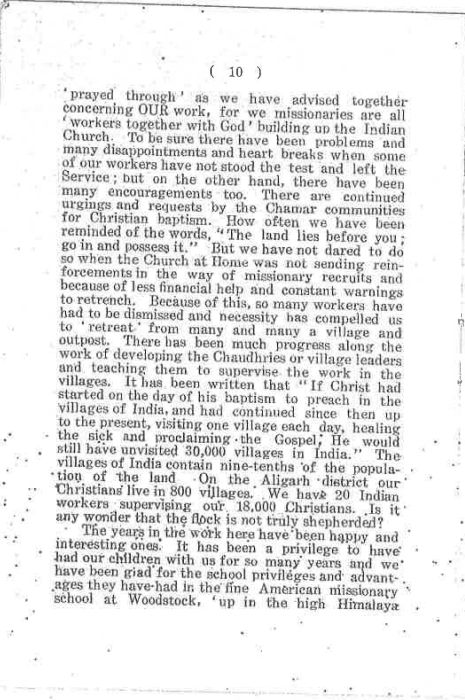
There have been many problems talked over and prayed through as we have advised together concerning OUR work, for we missionaries are all workers together with God building up the Indian Church. To be sure there have been problems and many disappointments and heart breaks when some of our workers have not stood the test and left the Service, but on the other hand, there have been many encouragements too. There are continued urgings and requests by the Chamar communities for Christian baptism. How often we have been reminded of the words, "The land lies before you, go in and possess it. But we have not dared to do so when the Church at home was not sending reinforcements in the way of missionary recruits and because of less financial help and constant warnings to retrench. Because of this, so many workers have had to be dismissed and necessity has compelled us to retreat from many and many a village and outpost. There has been much progress along the work of developing the Chaudhries or village leaders and teaching them to supervise the work in the villages. It has been written that If Christ had started on the day of his baptism to preach in the villages of India, and had continued since then up to the present, visiting one village each day, healing the sick and proclaiming the Gospel, he would still have unvisited 30,000 villages in India. The villages of India contain nine-tenths of the population of the land. On the Aligarh district our Christians live in 800 villages. We have 20 Indian workers supervising our 18,000 Christians. Is it any wonder that the flock is not truly shepherded?
The years in the work here have been a privilege to have had our children with us for so many years and we have been glad for the school privileges and advantages they have had in the fine American missionary school at Woodstock, up in the high Himalaya mountains.
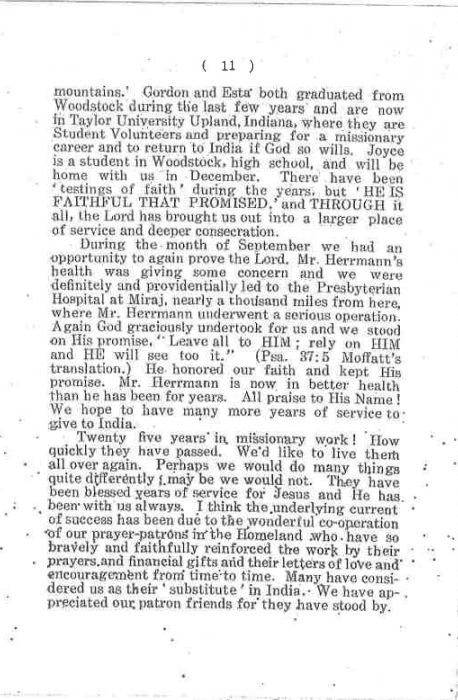
Gordon and Esta both graduated from Woodstock during the last few years and are now in Taylor University Upland, Indiana, where they are Student Volunteers and preparing for a missionary career and to return to India if God so wills. Joyce is a student in Woodstock, high school, and will be home with us in December. There have been testings of faith during the years, HE IS FAITHFUL THAT PROMISED, and THROUGH it all, the Lord has brought us out into a larger place of service and deeper consecration.
During the month of September, we had an opportunity to again prove he Lord. Mr. Herrmann 's health was giving some concern and we were definitely and providentially led to the Presbyterian Hospital at Miraj, nearly a thousand miles from here, where Mr. Herrmann underwent a serious operation. Again, God graciously undertook for us and we stood on His promise. "Leave all to HIM\; rely on HIM and HE will see to it." (Psa. 37:5 Moffatt's translation). He honored our faith and kept his promise Mr. Herrmann is now ln better health than be has been for years. All praise to his name! We hope to have many more years of service to give to India.
Twenty-five years of missionary work! How quickly they have passed. We'd like to live them all over again. Perhaps we would do many things quite differently\; maybe we would not. They have been blessed years of service for Jesus and He has been with us always. I think the underlying current of success has been due to the wonderful co-operation of our prayer-patrons in the homeland and who have so bravely and faithfully reinforced the work by their prayers and financial gifts and their letters of love and encouragement from time to time. Many have considered us as their substitute in India. We have appreciated our patron friends for they have stood by us.
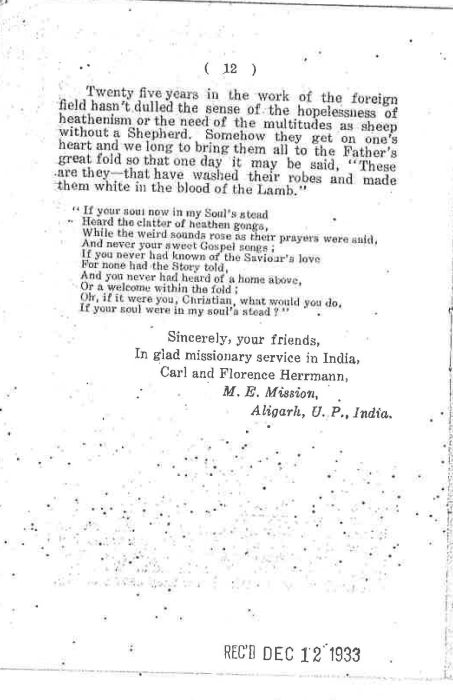
Twenty-five years in the work of the foreign field hasn't dulled the sense of the hopelessness of heathenism of the need of the multitudes as sheep without a shepherd. Somehow, they get on one's heart and we long to bring them all to the Father's great fold so that one day it may be said, "These are they that have washed their robes and made them white in the blood of the Lamb."
If your soul now in my Soul's stead,
Heard the clatter of heathen gongs,
While the weird sounds rose as their prayers were said,
And never your sweet Gospel songs,
If you had never had known of the Savior's love,
For none had the story told,
And you never had heard of a home above,
Or a welcome within the fold,
Oh, if it were you, Christian, what would you do,
If your soul were in my soul's stead?
Sincerely, your friends,
In glad missionary service in India,
Carl and Florence Herrmann,
M.E. Mission, Aligarh, U.P., India
______________________________________________________________________________________________________
© Camy Rea 2019
Add new comment